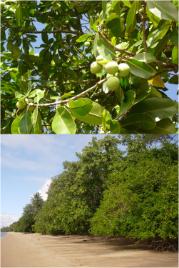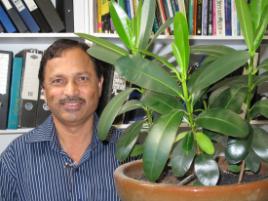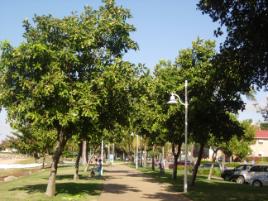Seeds of hope for motoring fuel from wild, native 'Beauty Leaf Tree'
Published on 20 August, 2009
One day your car might be running with the help of an Aussie native plant known as the ‘Beauty Leaf Tree'.
Early tests by CQUniversity scientists are promising enough to show the wild-growing tree is a potential source of biodiesel, if developed into plantations. LINK here for VIDEO about the innovation
But this is just one of its claims to fame, because it is also valued for medicinal properties (as ‘Domba Oil'), pretty flowers and wood quality.
Scientifically known as Calophyllum inophyllum, the plant produces abundant fruits, the seeds of which contain up to 60% of non-edible oil. It can produce up to 5000L of oil/ha/year.
PhD scholar Subhash Hathurusingha and his supervisor Associate Professor Nanjappa Ashwath have been crunching the numbers to see if the ‘Beauty Leaf' is viable as a motor fuel source.
LINK here to hear from Associate Professor Nanjappa Ashwath.
Subhash has spent a year in Sri Lanka, collaborating with mechanical engineer Gayan Kahandawa, to design a seed oil expeller and automated biodiesel reactor (which uses a 4-stage transesterification protocol to convert the highly viscous Calophyllum oil into biodiesel).

The oil-laden fruit and the tree growing wild
The biofuel was also put to work to see how smoothly it runs an engine. The first trial featured an autorikshaw carrying the Vice-Chancellor and Dean of Science of Sri Lanka's Uva Wellassa University as passengers.
Dr Ashwath says the beauty of the ‘Beauty Leaf Tree' is that it grows well throughout coastal areas of tropical Australia and can thrive on salty, drought-affected, acidic or waterlogged lands, which would otherwise remain unused.
He said a 4-stage automated bioreactor had been constructed to convert the plant oil to biodiesel, and the resulting quality was found to be better than fossil fuel in terms of low carbon emissions.

The first trial featured an autorikshaw

Associate Professor Nanjappa Ashwath with a potted Beauty Leaf Tree.Engine performance results also proved the ‘Beauty Leaf Tree' biodiesel generated as much power as fossil fuel.
"These trees can be established in plantations and the fruits could be harvested mechanically as in the macademia industry," Dr Ashwath said.
"Once established, the trees can live up to 200 years, producing fruits twice a year. Beauty leaf tree can yield up to 3000 litres of biodiesel per hectare per year. In addition, it will provide valuable timber, when harvested at the end of its production cycle.
"Beauty leaf tree can be grown either in plantations or along fence lines of farms in countries like Australia, India, Sri Lanka, Thailand and Indonesia. This can be grown as a biodiesel, medicinal or timber species.
"Beauty leaf tree bears a high economic potential owing to its multiple uses. It is a medicinal plant that has a number of important active compounds. Leaf and bark extracts were scientifically reported to have anti-HIV and anti-cancer compounds. It is also found in recreational parks. Flowers are suitable for apiculture. The timber is strong and durable."



